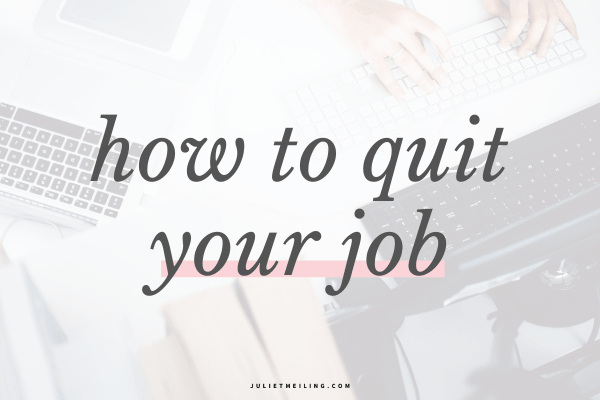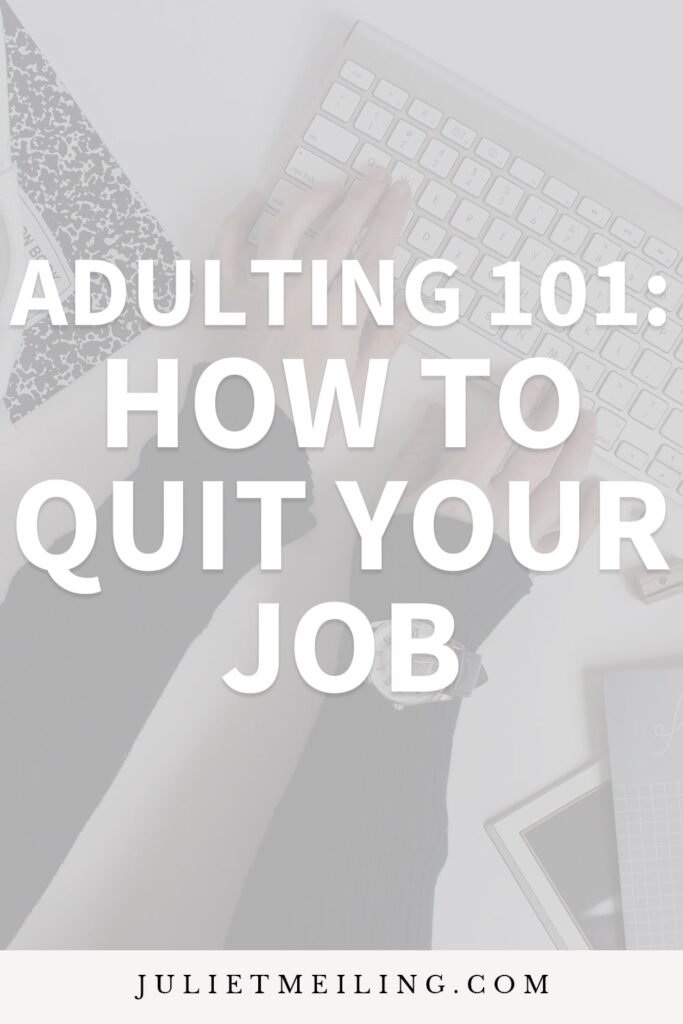Adulting 101: How to Quit Your Job
Learn how to quit your job the right way. The step-by-step on how to quit your job like a boss.
The decision to quit your job and to start a new job, pivot into a new career, or quit your job to relieve burnout is not to be taken lightly. It’s can be a major change in your life not only financially, but emotionally and mentally as well.
However, if you are ready to quit your job and want to go thrive somewhere else, you’ve come to the right place!
In this blog post, we will discuss how to quit your job and we will cover everything you need to do before walking through your employer’s doors for the very last time.
- Learn how to quit your job the right way. The step-by-step on how to quit your job like a boss.
- Determine your "why"
- Make an exit strategy
- Giving your 2-weeks notice
- Saying goodbye to your coworkers
- Wrapping up your duties
- Concluding thoughts on how to quit your job politely and professionally
- Thank you for reading about how to politely and professionally quit your job.

*This post may contain affiliate links. Purchasing a product or service through an affiliate will earn me a small commission at no additional cost to you. Please read our Disclaimer Policy for more information about the use of affiliate links on this site.
Determine your “why”
Before you quit your job, you need to think long and hard about why you even want to quit your job.
Is it because you don’t jive with the work culture? You feel overworked with little pay? Maybe you got a new job offer at a cool new start-up and need to quit so you can start your new job as soon as possible.
Whatever the reason, you need to have a strong reason or “why” for quitting your job.
And no, it’s not because you have to justify why you’re quitting your job to anyone, but you need to have something to remind yourself why you’re quitting.
Being able to visualize what’s next in your career or in your life after you quit your job will help you when you start having doubts about quitting your job or people start judging you for quitting your job.
When I resigned from working at my first job out of college as a Vision Therapist, I was indirectly judged by my co-workers for leaving my job to go back to graduate school.
Their comments made me feel guilty for quitting, but when I thought of the “why” behind my resignation I felt more confident in my decision to quit my job.
- I know that quitting my job meant creating a better life for myself educationally and financially.
- I know it also meant that I would be able to achieve my long-term goal of earning a graduate degree.
- And finally, it means that I get the opportunity to pave the way towards long-term stability for my future and my future family.
Having a solid “why” for quitting your job also ensures you aren’t quitting out of emotion.
Quitting a job out of emotion should be approached differently such as talking to your boss, manager, or the human resources department to come up with a plan to resolve whatever issues there may be.
Quitting a job out of anger towards your boss, co-worker, or client/customer also leads to bridges being burned, so I highly recommend seeking a resolution and allowing yourself to think rationally about the situation before storming out of the office and never coming back again.
Make an exit strategy
The process of quitting your job needs to be done with intent. Without a solid strategy in place, it may be difficult to financially support yourself or find another job after you quit your job.
Financially preparing before quitting your job
Before you quit your job you need to have a game plan for how you will financially support yourself without your normal, consistent stream of income.
Preferably, you should set aside 3 to 6 months worth of money to pay for all your expenses before quitting your job.
However, if you decide to quit your job on a whim, which I don’t recommend you do, then your emergency fund can help you get by until you find a new job.
By having a 3 to 6-month nest egg you are able to quit your job, still pay rent, buy food, keep a relatively normal standard of living, and job hunt for a while.
I would recommend saving up as soon as you come to the realization that you want to quit your job.
Depending on how soon you want to quit your job, I would set aside at least 20% of each paycheck and put it into a savings account specifically for this occasion.
One of the best ways to start saving up to quit your job is by opening an account with Qapital.
Qapital makes it super easy to make your savings automatic. You simply connect your existing checking account to your new Qapital account, open up a savings goal specifically for your “quit your job” nest egg, and set up the Payday rule to automatically transfer 20% of each paycheck into your new savings goal in Qapital.
This was the exact strategy I used to save a small nest egg before quitting my job to go to graduate school.
With Qapital, I was able to save up enough money to pay my bills until I received my first stipend payment as a Graduate Teaching Assistant and my student loan refund.
However, if you do not have enough money in your savings or money in your emergency fund by the time you quit your job, you may have to get a part-time job or start a side hustle, like DoorDash, driving for Uber, walking dogs or pet sitting, etc., until you find a new full-time job.
And if you are still struggling to get by, you will need to start cutting out expenses like your Netflix or Hulu subscription. If you need any recommendations on how to become more frugal, this blog post is perfect to follow-up on after you finish reading this one!
Having another job lined up before quitting your job
Ideally, you would already have another job lined up before quitting your job.
Having another job lined up ensures you can remain financially secure during the transition from your old to your new job and you don’t have to gamble with the job market.
It can be difficult, however, to find a job while still working at your current job. Especially if you are working a 9-5 Monday through Friday and don’t have the means to take off work to attend interviews.
If possible, try setting up phone or video interviews instead of having in-person interviews, so you don’t have to call out of work or fake an illness to go to interviews.
While you are interviewing for a new job, I would keep your job hunting activities a secret because you do not want to be fired while job hunting.
So, avoid browsing job listings during your work hours or having a company or job recruiter reach out to your office phone because that could get awkward very fast.
Giving your 2-weeks notice
Once you have found the perfect new job or have the money saved up to quit your job, it is time to give your resignation! But now you’re probably wondering: How do I tell my boss I quitting?
Ideally, you want to give your work at least 2-weeks notice before quitting, but it can vary depending on the work that you do and how complex training your replacement will be.
Personally, I gave a two-month notice before resigning from my job.
It was a very generous notice, but I needed to do it so I could pass along my vision therapy patients to a new vision therapist and they could hire a new receptionist as well (since I kinda did both jobs).
Writing your resignation letter
Writing your resignation letter is pretty easy, but if you don’t know what to say here are some pointers:
Be positive and professional in your letter of resignation
Even if you worked in the most toxic work environment you still need to act professionally and write as though you had a positive experience at the company.
Writing in a positive and professional manner will ensure you can still ask for a reference down the road for future jobs or have the opportunity to be rehired.
Explicitly state your last day of work
It is very important that you make it obvious when your last day of work will be.
If you do not include this date, your boss could potentially still call you into work because it was not communicated in writing when your last day of work would be.
I would state your final day of work within the first two to three sentences of your resignation letter.
For example:
I am writing to give my formal notice that I will be resigning as a [job title here] at [company name]. My last day will be [month, day, and year].
Let your boss know how their company has helped you grow professionally or personally
At the end of the day, you were hired to enhance a company’s short-term and long-term growth. They would not have hired you if they did not need your skills and labor to further grow their company.
Along the lines of being positive and professional in your letter of resignation, I would suggest adding in a sentence or two of the things you learned or appreciated about working at the company.
For example, in my letter of resignation, I mentioned how I appreciated the opportunity to learn and help patients improve their eyesight (again, I was a vision therapist, so don’t use my example unless it fits your job). I also mentioned how I enjoyed the opportunity to work at a women-led company.
Keep it simple and to the point
Your resignation letter should be a page long at most. And that includes the formalities of the letter like your name, address, contact information, and the formal greeting and closing of the letter.
Your boss is busy and does not have time to read a novel about why you are resigning from your job.
Keep your resignation letter short and don’t add the fluff. Your boss does not need to know about the step-by-step thought process you took to realize you needed to quit your job or the amazing opportunity you have lined up next.
Keep those thoughts and experiences to yourself, write the letter, and then go thrive in your new opportunity!
Make it known that you are willing to help the company transition your work duties to another employee
After you hand in your formal resignation, your job at the company is not done.
At a minimum, you still have two weeks at that job and you need to remain helpful.
It’s like the first 90-days at the job (also known as a the trial period), they’re super important and determine whether or not your company will keep you employed.
The final 14 days of work are just as important because they will determine if you can be rehired or given a reference in the future–so no slacking! You still got work to do!
Make it known at the end of your letter of resignation that you are willing to help ease the transition for your boss and the employee(s) who will take over your duties.
And not only state that you are going to help with the transition, but actually take action and make the transition as easy as possible for your boss and the employee(s). You do not want to give empty promises!
Telling your boss you are quitting your job
The process of writing your letter of resignation is a surreal experience, especially if you have been at the company for a long time. However, quitting your job does not stop at writing your letter of resignation.
Once you write your letter of resignation you have to hand it in. And this is probably the most nerve-wracking part of the whole resignation experience!
Handing in your resignation letter to your boss is like ripping off a band-aid.
But you can do it, I know you can.
Here are some pointers for telling your boss that you are quitting:
Tell your boss before the weekend
Quitting your job can be an awkward experience, especially having to face your boss the day after you hand in your resignation.
For some bosses, it may take time for it to settle in that you are quitting your job and to make arrangements to cover your duties.
I highly suggest telling your boss that you are quitting your job and handing in your resignation letter on a Friday right before your boss leaves for the weekend.
That way they will have two days to process it, you will have two days to process it, and you can start the new week with less awkwardness.
And don’t worry, you aren’t going to ruin your boss’s weekend.
Resigning from a job is a professional transaction, so if your boss gets angry or upset that you are quitting–that’s on them and their lack of professionalism.
When you quit or resign from a job, for whatever reason, you are simply doing what is best for you just like your boss would do what is best for them and their company.
Your boss should be the first person to know that you are quitting
The last thing you need at work is drama, so try to keep your thoughts and plans to quit your job to yourself until you tell your boss.
By telling your coworkers that you are quitting before your boss, you are digging yourself a hole and could be at risk of getting fired before you can even properly resign.
Simply put, tell the person who signs your paychecks that you are quitting your job before you tell anyone else!
Tell your boss in private that you are quitting your job
The most awkward thing you could do when quitting your job is telling your boss while they are busy with another task, talking to one of your coworkers or clients, or out in the open in the middle of the office.
When you are ready to tell your boss that you are quitting your job you need to pull them to the side and tell them privately.
And there are two ways you can go about this:
- Send your boss an email to let them know you’d like to talk to them privately
- If your boss is not busy, ask them if they have a moment to talk for 5-10 minutes in private/in their office.
I would not suggest texting your boss just because it could look unprofessional. Unless you work in a very laid back office!
When you are telling your boss that you are quitting your job, have your resignation letter in hand and briefly explain to them why you have asked them to talk in private.
You don’t have to go into every single detail about why you are quitting your job, but at least let them know a little bit about your next steps after you leave their company.
For example, “Thank you for speaking to me in private. I am handing in my resignation letter because I have been offered the opportunity at another company.”
Or…
“Thank you for speaking to me in private. I have been accepted into graduate school and I am here to turn in my resignation letter.”
Dealing with counteroffers
Depending on how valued or needed you were as an employee, you may be given a counteroffer by your boss to entice you to stay. That could be higher pay, better benefits, or a promotion.
Unless it is a counteroffer that is better than the new opportunity, I would recommend you stand your ground and continue your path towards your new job or opportunity.
Think of it this way…
You worked hard applying to this new opportunity, making time for interviews, and negotiating pay, benefits, etc. with your new job or opportunity.
There’s also is a reason why you decided to seek out a new opportunity in the first place, so don’t let the fear of turning down your boss prevent you from furthering your career or education.
If you do decide to stay with your current company and accept the counteroffer, but make sure you get it in writing from your boss.
Personally, I was not given a counteroffer, I was simply asked if I could work part-time. But I don’t think I would have stayed even if provided a promotion or higher pay.
The opportunity to attend graduate school with a tuition waiver and stipend was just too good to pass up!
Saying goodbye to your coworkers
It is totally up to you whether or not you want to tell your coworkers you are leaving the company.
If you work at a large company, it may not matter as much, but if you work at a small company then your absence will definitely be noticed and I would consider telling everyone that you are leaving.
Regardless if you want to tell the whole office you are quitting your job, you absolutely need to tell any coworker who will be taking over your duties as soon as you wrap up your “I’m quitting my job” conversation with your boss.
Your coworker(s) will appreciate you giving them a timely heads up that they will be taking on more responsibility with your absence and you can work on helping them transition more smoothly.
When telling your coworkers you are leaving the company, be positive and respectful of the company even if you had a negative experience. You want to leave on good terms not only with your boss but also with your coworkers.
Because at the end of the day, you did spend 7-8 hours with them and you want to acknowledge that you appreciated the opportunity to work with them. Also, these coworkers could help you find a job or other opportunities to pursue and provide a good reference–#networking.
Wrapping up your duties
Once you hand in your resignation that doesn’t mean you are done with work. You still need to wrap up your duties and transition your work to a new employee or a fellow coworker.
Depending on your job, it will look different on how the transition will be completed, but if your job position is complex you could make a reference binder to help whoever is taking over your duties.
Additionally, even after you resign, you still want to uphold your normal work ethic.
So don’t start getting lazy at work until you walk out those office doors for the final time.
Your company is still counting on you as an employee and continuing to work hard until your final day will mean a lot to your boss and coworkers.
Concluding thoughts on how to quit your job politely and professionally
Making the decision to quit your job is a big one and it is certainly not something you should do on a whim or not take time to create an action plan for.
In today’s blog post I shared with you the how-to guide to quitting your job gracefully that will help you have references for future jobs and remain on good terms with your company even after you leave them.
Here is how you can quit your job professionally:
- Determine why you want to quit your job–school, new job opportunity, health reasons, toxic work environment, etc?
- You need to prepare financially before you quit your job, so consider saving up 20% of each paycheck for a few months before quitting your job. Opening up a Qapital account makes this process seamless!
- You will be at a greater advantage financially if you have a job already lined up before quitting your job.
- You will want to give at least a 2-week notice to your boss before quitting your job.
- Write a letter of resignation to state when you will be leaving the company.
- Tell your coworkers that you are leaving after you inform your boss and especially tell the coworker(s) who will be taking over your duties.
- Remain professional and continue to work hard at your job after you hand in your resignation.
Thank you so much for reading this post on how to quit your job. I hope these tips and tricks were helpful to you and I wish you nothing but success in your next endeavor!
Related to life after college and career
- 7 Things No One Tells You About Life After College
- 9 Steps You Can Take To Prep For Post-Grad Life
- How To Make A Resume As A College Student With No Work Experience
Save this blog post to read or refer back to later by clicking the Pinterest share button below this image.







